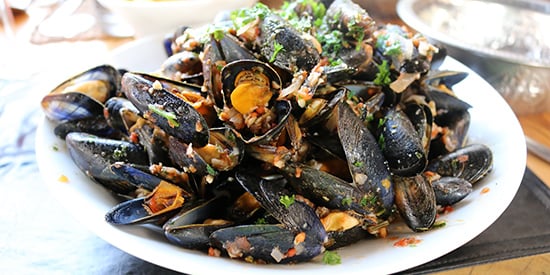Scientists call for mussel munch to help counter omega-3 crunch
Media release
Mussels can serve our long chain omega-3 needs at a potentially lower environmental and economic cost than fishy alternatives, according to a new international study led by a Deakin University nutrition scientist.
Dr Lee Hamilton, a lecturer in Deakin's Institute for Physical Activity and Nutrition (IPAN), said just one in five people globally met recommended omega-3 targets, and there was not enough omega-3 in the ocean to service the world's needs.
"Most people don't get enough long chain omega-3 because they're not eating enough oily fish or shellfish. But if the world's population did hit that target, it would decimate the ocean's food stocks," Dr Hamilton said.
"Marine derived omega-3s are critical for human health, but popular sources such as salmon aren’t as environmentally friendly as some shellfish sources. So what our study wanted to examine was whether a more environmentally-friendly alternative could be effective at improving the omega-3 index - a measure of whether a person is getting enough omega-3 in their diet."
Dr Hamilton said the pilot study - carried out with his aquaculture colleagues at Stirling University in Scotland - aimed to determine if providing mussels as the protein component of a few lunchtime meals per week could be effective at improving study participants' omega-3 index.
The team monitored the diets of 12 Scottish university students, feeding them a third of their calories at lunch with mussels as the protein source, three times per week for two weeks.
"This was what we call a 'food first' approach to nutrient supplementation. Rather than providing a dietary supplement to supply additional quantities of a nutrient, we supply whole food known to be rich in that particular nutrient," Dr Hamilton said.
"The meals were also tailored to the individual's regular diet. So depending on the person's typical calorie intake, they ate a different amount of mussels, and we cooked them a number of different recipes, including spaghetti with mussels, mussel couscous, and bread with mussel broth.
"We found that this relatively small but consistent amount of mussels was enough to help the study participants meet recommended omega-3 targets, and some of them even saw an improvement in their omega-3 index. That's critical as the omega-3 index is an important marker of heart health."
Dr Hamilton said omega-3s were an essential fatty acid, also needed for proper brain development and inflammatory balance.
"Our body can make long chain omega-3 fatty acids from the omega-3s found in canola oil and walnuts, but the process is very inefficient, and we need marine sources of omega-3 fatty acids to improve our omega-3 index," he said.
"The Australian Heart Foundation recommends two to three portions of fish per week, including some of the oily fish that contain high amounts of omega-3s. The aim is to achieve an intake of 250-500mg of omega-3 per day.
"For people not meeting omega-3 requirements, introducing mussels to their diet a few times a week could be a good strategy."
Dr Hamilton said mussels were generally farmed sustainably and had a very low carbon footprint in comparison to other meats, including farmed salmon.
"Because they are plankton-filter feeders mussel aquaculture is considered to have a minimal environmental impact," he said.
"I really want to re-frame how people see mussels. Mussels are not just a starter in a fancy restaurant, they can be used as a protein component in a variety of ways.
"If the mussels are purchased fresh from a local supplier then the price point is not that much different to more common meat sources in Australia, and the price per milligram of omega-3 is similar to other popular sources like salmon."
'Mussel Consumption as a "Food First" Approach to Improve Omega-3 Status' was published in a recent edition of the journal Nutrients.

